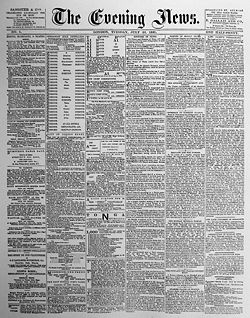The Evening News (London newspaper)

The first issue of The Evening News published on July 26, 1881
|
|
| Owner(s) | Associated Newspapers |
|---|---|
| Editor | Martin Fradd (1881-1882) Charles Williams (1882-1883) |
| Founded | (1) July 26, 1881 (2) February 25, 1987 |
| Ceased publication | (1) October 31, 1980 (2) October 30, 1987 |
The Evening News, earlier styled as The Evening News, was an evening newspaper published in London from 1881 to 1980, reappearing briefly in 1987. It became highly popular under the control of the Harmsworth brothers. For a long time it maintained the largest daily sale of any evening newspaper in London. After financial struggles and falling sales it was eventually merged with its long-time rival the Evening Standard in 1980. The newspaper was revived for an eight-month period in 1987.
The paper was founded by Coleridge Kennard and Harry Marks. The first issue appeared on July 26, 1881. It was the first popular evening paper in London. It was priced at one halfpenny, distinguishing itself from the more serious penny papers such as The Times. The first issues were printed on light blue paper and later editions on yellow and green paper.
The rivalry between halfpenny papers in the late 19th century was fierce and almost ended the Evening News. According to some sources the paper was losing £40,000 a year. In 1894 the brothers Alfred and Harold Harmsworth bought the paper for £25,000.
In 1888 Alfred had founded a paper called Answers that was modelled after another popular paper called Tit-Bits. Harold gave up his clerk’s job to handle the business-side of the papers while Alfred effectively controlled the papers with great success. Later on Alfred became Lord Northcliffe and Harold became Lord Rothermere. The brothers started several papers of which the Daily Mail became the most influential.
Under the editor Kennedy Jones the Evening News was one of the papers that transformed the English press with their so-called new journalism. This meant that the papers were aimed at a wider general public than the traditional ones, such as The Times.
...
Wikipedia
